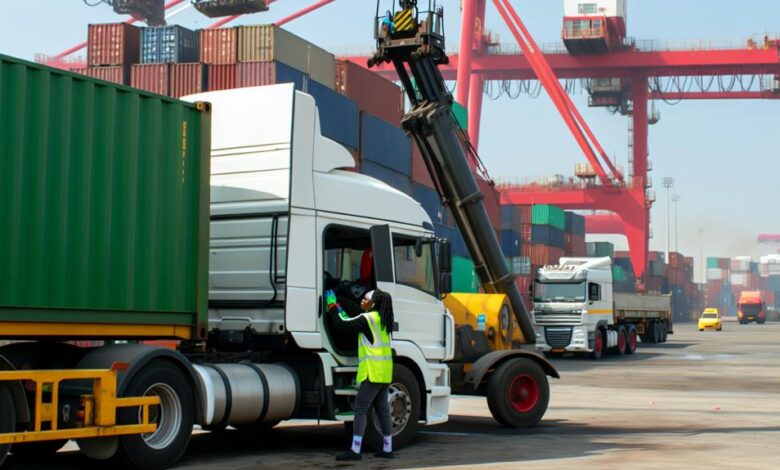Intermodal Truck Driver Career: What You Need to Know

Starting a career as an intermodal truck driver means you’ll be at the heart of the logistics network, moving freight efficiently across various transportation modes. You’ll need to master advanced driving techniques and ensure every cargo load is meticulously secured. It’s not just about driving; you’ll also adhere to strict safety regulations and use cutting-edge technology to navigate complex logistics. This role offers competitive wages and job stability, but it’s not without its challenges. Curious about the skills and training required or the steps to get started? Let’s explore what it takes to succeed in this dynamic field.
What Is Intermodal Trucking?
Intermodal trucking, often referred to as drayage, involves the transportation of freight using multiple modes of transportation, such as ships, trains, and trucks, without handling the actual cargo when changing modes. This method significantly boosts efficiency and reduces costs, thanks to standardized containers that seamlessly transfer between different transport forms.
You’ll find that the industry growth in intermodal trucking has been robust, driven by global trade expansion and advances in logistics technology. Companies increasingly rely on this system to streamline supply chains and optimize delivery times. As a result, the demand for skilled intermodal truck drivers has surged, offering numerous career opportunities.
Moreover, the environmental impact of intermodal trucking is notable. By integrating rail and sea transport, which are more fuel-efficient and have lower emissions compared to road transport alone, the industry significantly reduces its carbon footprint. This shift aligns with global sustainability goals and regulatory pressures to decrease greenhouse gas emissions.
Understanding intermodal trucking’s complexities and its benefits can position you well within this evolving field. Embracing this career means contributing to a more efficient and environmentally friendly transportation system, playing a pivotal role in the logistics chain.
Required Skills and Training
Embarking on an intermodal truck driver career requires a blend of specialized skills and comprehensive training. First and foremost, you’ll need to master advanced driving techniques. Intermodal trucking often involves operating large vehicles in tight spaces, so proficiency in maneuvering and reversing is crucial.
You’ll also need to be adept at coupling and uncoupling trailers, as this is a frequent task in intermodal transport.
Understanding and adhering to safety regulations is equally important. The Department of Transportation (DOT) mandates specific guidelines for commercial drivers, including hours of service, vehicle inspections, and cargo securement. You’ll need to stay updated on these regulations to ensure both your safety and compliance with the law.
Formal training typically begins with obtaining a Commercial Driver’s License (CDL). Many employers prefer candidates who’ve completed a professional truck driving school program, which covers essential topics like driving techniques, defensive driving, and safety regulations.
Additionally, hands-on experience with intermodal equipment—such as chassis and containers—is invaluable.
Continuous learning is a part of the job. Regularly attending workshops and training sessions will help you stay current with industry standards and technological advancements, ensuring you remain a competent and safe driver.
Job Responsibilities
As an intermodal truck driver, your job responsibilities extend beyond merely transporting goods from point A to point B. You’ll need to engage in meticulous route planning to ensure efficient delivery, taking into account traffic patterns, road conditions, and the most cost-effective paths. Utilizing GPS systems and staying updated on real-time traffic information is essential to avoid delays and optimize fuel consumption.
Cargo handling is another critical aspect of your role. You’ll be responsible for inspecting the cargo before loading it onto your truck, ensuring it’s securely fastened and complies with safety regulations. Properly balanced loads prevent shifting during transit, minimizing the risk of accidents.
You’ll often work with specialized equipment to load and unload containers, requiring a good understanding of how to operate these tools safely and effectively.
Additionally, maintaining accurate records of your deliveries, including cargo documentation and delivery confirmations, is crucial. You’ll communicate regularly with dispatchers and customers to provide status updates and address any issues that arise. By managing these responsibilities diligently, you ensure the smooth, timely, and safe delivery of goods, which is the cornerstone of your profession as an intermodal truck driver.
Benefits of the Job
A career as an intermodal truck driver offers a range of benefits that make it an attractive profession. One of the primary advantages is the impressive salary potential. Intermodal truck drivers often earn competitive wages, with many companies providing additional incentives such as bonuses for safety and efficiency. This can significantly boost your overall earnings. Moreover, the demand for skilled drivers in this sector ensures job stability and opportunities for financial growth over time.
Another significant benefit is the improved work-life balance compared to other trucking roles. Intermodal drivers typically operate within local or regional areas, meaning you’re less likely to spend extended periods away from home. This setup allows you to maintain a more consistent schedule, giving you the chance to spend quality time with your family and pursue personal interests.
The structured routes and predictable hours contribute to a healthier lifestyle, reducing the stress often associated with long-haul trucking.
Furthermore, the intermodal sector often involves working with advanced logistics systems and modern equipment, enhancing your technical skills and job satisfaction. By choosing a career in intermodal trucking, you can enjoy a well-rounded professional life that balances financial rewards with personal well-being.
Challenges to Consider
One of the key challenges in the intermodal truck driving profession is navigating the complex logistics and coordination required for efficient operations. You’ll need to master time management to ensure timely pickups and deliveries across different transport modes—rail, sea, and road. This isn’t just about driving from point A to point B; it’s about syncing schedules with multiple stakeholders, including port authorities, rail operators, and warehouse managers.
Traffic navigation is another significant hurdle. Urban areas and port locations can be congested, requiring advanced planning and real-time adjustments to avoid delays. Effective use of GPS technology and traffic monitoring tools can help, but you’ll also need sharp problem-solving skills to reroute on the fly.
Moreover, regulatory compliance adds another layer of complexity. You’ll have to stay updated on various regulations, such as hours-of-service rules and environmental guidelines, which can differ between jurisdictions. Balancing these regulations while meeting tight delivery windows demands meticulous attention to detail.
Steps to Start Your Career
Embarking on a career as an intermodal truck driver involves several crucial steps that will set the foundation for your professional journey. First, you need to obtain a Commercial Driver’s License (CDL). Enroll in a truck driving school that offers comprehensive training programs, ensuring you’re well-prepared for the CDL exam.
Next, gain experience by working with a reputable company. Entry-level positions can help you understand the nuances of intermodal logistics.
Research the job market thoroughly. Understanding the demand for intermodal truck drivers in different regions can help you make informed decisions about where to seek employment. Networking with industry professionals can also provide valuable insights into job opportunities and trends.
Consider the salary potential. Intermodal truck drivers often have a competitive salary due to the specialized nature of their work. Salaries can vary based on experience, location, and the specific employer, so it’s essential to negotiate effectively and understand what you’re worth.
Lastly, stay updated with industry regulations and continuous education. The transportation sector is dynamic, and keeping abreast of the latest regulations, technologies, and best practices will make you a valuable asset to any employer, ensuring long-term career growth.
Conclusion
Embarking on a career as an intermodal truck driver is akin to taking the helm of a modern-day Odyssey. You’ll need to master advanced skills, adhere to strict regulations, and utilize cutting-edge technology. While the road ahead may have its challenges, the rewards—competitive wages, job stability, and growth opportunities—are well worth the journey. If you’re passionate about driving and logistics, this career path offers a fulfilling and impactful adventure.



